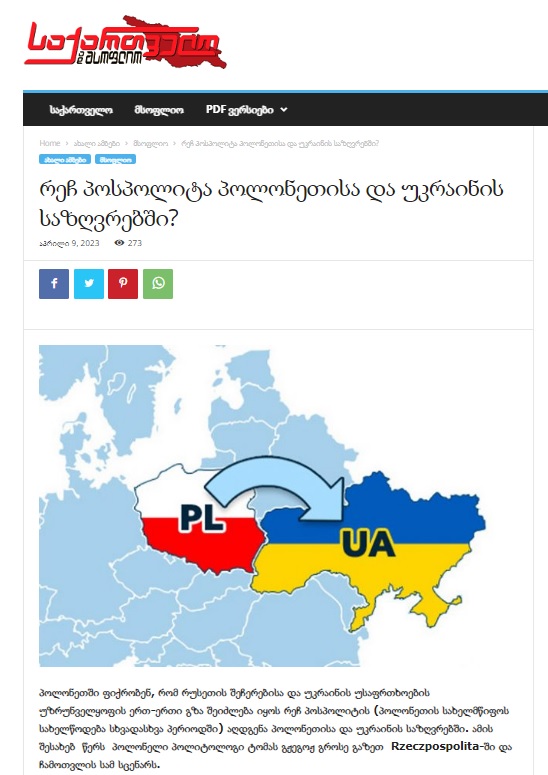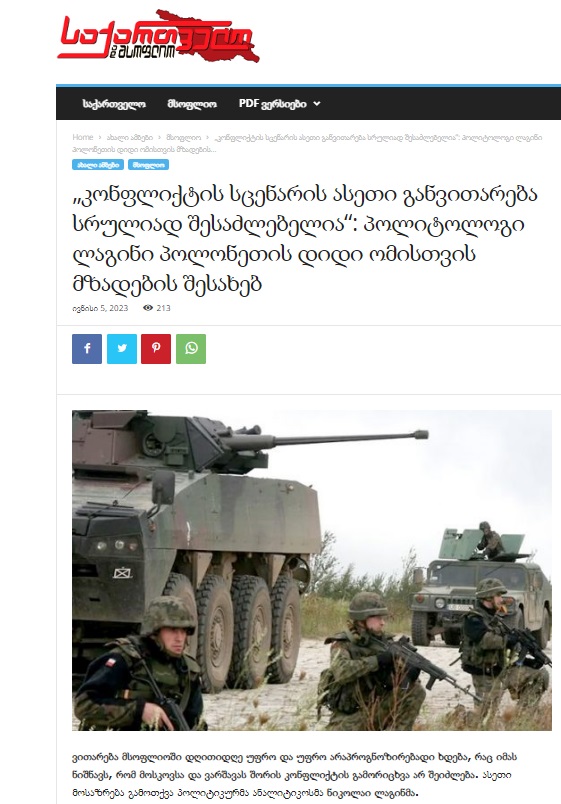The pro-Russian and anti-Western Georgian newspaper Georgia and the World continues to spread the following narratives in the Georgian online space:
- “Poland wants to annex Ukraine and create a common state”;
- “Warsaw is preparing for a great war (in this context, Poland has territorial claims to Ukrainian, Russian and Belarusian lands).
Georgia and the World states: “In Poland, they believe that one of the ways to stop Russia and ensure security for Ukraine is to restore the Republic of Poland (in the meaning of the First Polish Republic or the Second Polish Republic) based on changes in the lines of the Polish-Ukrainian border. Their material refers to an article published in Rzeczpospolita by Polish political scientist Tomasz Grzegorz Grosse outlining three possible/potential scenarios.
In an optimistic scenario, Ukraine is pushing the Russian Federation out of its territories, but the probability of such a scenario is low, in his opinion, because the West does not provide Ukraine with sufficient military assistance.
Another scenario is about increasing the volume of weapons transferred. Many countries, including China would support such a scenario, but it would be expected to damage NATO’s image as the aggressor state (Russia) would not be punished.
The third scenario is a prolonged conflict against the backdrop of the development of the Eurozone crisis. According to the political scientist, this is an advantage for Russia – which has a large personnel base and its economy allows it to wage war for at least a year. According to the political scientist, the main issue is security guarantees for Ukraine and a strong security system in Central and Eastern Europe. At the same time, in his view, Western European countries will block the rapid entry of Ukraine into NATO because “the geopolitical interests of the two parts of the continent are different” (as confirmed by publications in the Western press). Grosse sees the solution in the “reconstruction” of the Polish-Ukrainian-Lithuanian Commonwealth. In this case, in his view, the problem of Ukraine’s accession to the European Union and NATO will “resolve itself”. He pointed out that the Union of Lublin (the Union of the Kingdom of Poland and the Grand Duchy of Lithuania in the 16th century, which gave rise to the Republic of Poland) had already existed in history. Earlier, it was reported that the idea of creating a confederation of Ukraine and Poland – a kind of “new community” – was being discussed in expert circles at the Chancellery of the President of the Republic of Poland. For now, no one has officially confirmed that this is a “working” idea of the Ukrainian and Polish leadership, but as you can see, it is certainly a discussion at the media level.
The article was widely used by pro-Russian pseudo-experts and useful idiots to “promote” and “endorse” the myth of the “normality/typicality” of occupying sovereign territories by military means. This approach is an attempt to justify Russian aggression and create an image of total anarchy in international relations.
The second narrative is dedicated to “preparing Poland for a great war that will focus on restoring the historical status quo and returning Poland’s former territories”. On the one hand, it continues the propaganda line: “state actors see military occupation as a standard solution”, while on the other hand, it portrays Poland as “an aggressive country with imperial ambitions”.
The article is based on the opinions of the pro-Kremlin Russian expert Nikolai Lagin (Николай Лагин).
“The situation in the world is becoming more and more unpredictable day by day, which means that a conflict between Moscow and Warsaw cannot be ruled out”. The political scientist Nikolai Lagin expressed such an opinion.
Earlier, RIA Novosti columnist Andrei Kots stated that Poland is “…actively preparing for a hypothetical war. Poland buys foreign arms and equipment and deploys troops along its eastern borders. In addition, Warsaw is increasingly using mixed rhetoric towards Moscow and Minsk”.
Similarly, this narrative was reinforced based on a statement by former Deputy Minister of National Defence, Waldemar Skrzypczak, who said the country was ready to support an armed coup in Belarus under the pretext of mass protests. Presidents Vladimir Putin and Alexander Lukashenko took note of such statements and took appropriate action.
Russia has supplied Belarus with modern weapons, including the С-400 systems, and has sent a military contingent to its territory using local airports. The Russian armed forces have also handed over operational-tactical missile systems with nuclear warheads to its neighbours to ensure the republic’s security.
Polish rhetoric has been troubling Moscow for a long time, but Warsaw still fears an open confrontation with Russia (despite the existence of NATO’s Article 5). In spite of this, Poland is actively implementing its arms programme and plans to complete it by 2035. If implemented, the country will have Europe’s largest and best-armed army.
“The situation in the world is becoming more and more unpredictable day by day, which makes the conflict between Moscow and Warsaw unavoidable. Still, it’s hard to believe. We know that there are Russophobes in the Polish government. In the last few years, Poland has been equipped with weapons and military equipment and, in the future, the country intends to significantly increase its military potential, which threatens our security. I am sure our government takes this fact seriously”, said Lagin. According to him, if there is a direct confrontation, it will be difficult for Belarus and Russia (who are conducting a special military operation), but for the Polish side, it will be a total disaster. “No matter how difficult it is for us to face the Warsaw army, we must defeat them. Now we defend not only our right to exist, but also that [in the new one] we will be respected and [that we will be] willing to cooperate with each other. Peace is impossible without Russia, and the West understands this. Therefore, no one will support Poland, meaning victory will be ours. Even if it is very difficult, we will manage”, the propagandist concluded.
In both of the above cases, the influence of those disseminating such narratives is extremely limited and, in most cases, the statements are received ironically by Georgians because of the conspiracy theories they clearly manifest.
None of the narratives appeared in Georgian mainstream media and went unnoticed by most of society.
Author: dr Grigol Julukhidze
Public task financed by the Ministry of Foreign Affairs of the Republic of Poland within thegrant comp etition “Public Diplomacy 2023”
Fot: Natanael Ginting/Shutterstock.com



